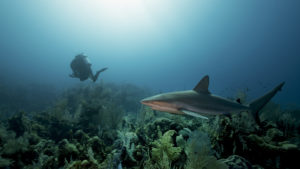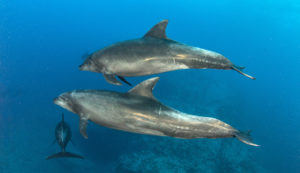Spring is just around the corner, offering the promise of longer days and much-needed sunshine. And why not start the new season right with a trip to one of these epic destinations around the world? Here are our picks for five great March dive destinations.
Tubbataha, the Philippines
Almost 386 square miles (100,000 hectares) of pristine reef in the Tubbataha Reef National Park mean spectacular diving in the Philippines at this time of year. It’s no surprise this special national park has received UNESCO World Heritage status.
Scuba diving Tubbataha is only possible by liveaboard. The short dive season runs from March to June, when the skies and seas are at their finest. Surrounded by thriving reefs and abundant marine life, diving here features numerous dive sites around three uninhabited islands.
Sitting in the Coral Triangle, there are around 350 species of corals. There are over 500 species of fish, plus 13 species of whales and 11 shark species at Tubbataha. The water is crystal-clear, the colors are vibrant and it’s a great destination for underwater photography. Huge schools of fish will engulf you. You might see green and hawksbill turtles, as well, plus mantas and eagle rays amidst the action.
One of the best things about this unique destination is that the diving is suitable for all experience levels thanks to the sheer diversity of dive sites.
Cuba

Now that Cuba is more accessible, this warm-water destination is well worth visiting for varied diving and the best sea conditions in March. With over 3,400 miles (5500 km) of coastline and unique dive spots, there is something for every diver to enjoy.
A labyrinth of over 20 cave systems will keep adventurous divers happy. There are also wrecks, drop-offs, and the UNESCO-protected Jardines de la Reina. These ‘Gardens of the Queen’ form a chain of 250 coral and mangrove islands teeming with marine life.
There is an astonishing diversity of marine life in Cuba, thanks to its reef system forming part of the world’s second-largest coral reef. The mangroves are home to manatees and there are nearly 100 different species of sharks. You may also see numerous dolphin species, rays and 700 or so fish species. It is also possible to dive with whale sharks at certain times of year, with November being the best month for doing so.
This quiet and well-preserved dive destination has been less affected by tourism than other places, with just a handful of Cuba liveaboards operating. It’s best to book early, as a limited number of visitors can come each year.
Socorro Islands, Mexico

If you’re a fan of megafauna diving, March is a great month to go scuba diving in Socorro. Surround yourself with ocean giants while making the most of winter’s calmer seas and great water visibility up to 164 feet (50 m).
This isolated liveaboard diving destination offers diving around a group of four volcanic islands sitting 250 miles (400 km) off the coast of Baja California. Futhermore, it’s a paradise for large pelagics. Being an ancient migration pathway for humpback whales, hundreds of these iconic whales arrive each winter and you can hear — and sometimes see — them while diving.
San Benedicto Island, one of the Revillagigedo Islands, offers the chance to dive with the world’s friendliest giant Pacific manta rays, known for their tolerance of divers and huge wingspans up to 23 feet (7 m) across. These fascinating rays congregate at submerged pinnacles and cleaning stations, coming close to divers as they pass by. You can also dive with pods of bottlenose dolphins as they follow the mantas and mimic divers’ movements.
Scapa Flow, Scotland
Scotland might not be at the top of every diver’s wish list, but it offers some of the best diving in Britain at the wreck-diving mecca of Scapa Flow.
Sheltered by surrounding islands, the waters at Scapa Flow form a calm, natural harbor in the Orkney Islands. A visit in March will see you enjoying the best visibility as you explore all this cold-water dive destination has to offer.
Once the former chief base of the Royal Navy, the islands held the German High Seas Fleet at the end of World War I until a German commander, fearing the vessels would be taken by the Allies, gave the order to scuttle the entire fleet. Fifty-two of those vessels remain there today and provide a wealth of wreck diving opportunities, including shallow and deep wrecks for all experience levels.
There are a number of dive operators offering charters to Scapa Flow and a PADI dive center on Orkney itself.
Micronesia
Most divers know all about Micronesia’s incredible diving and will easily name Palau and Chuuk Lagoon as two bucket-list destinations. But there are three other Micronesian hidden gems: Pohnpei, Kosrae and Yap.
Yap is all about the big animals, with the main draw being the year-round presence of graceful manta rays at a variety of dive sites. This coral-fringed island is also great for shark diving, featuring sharks at most dive sites. Fans of smaller critters will also be pleased, with colorful mandarinfish, pipefish and plenty of other macro highlights around. The easy currents and warm water make Yap diving suitable for all divers. The best time to dive Yap is during manta-mating season from December to April.
Once you’ve had your fill of Yap diving, hop over to Pohnpei. the ‘Garden Island.’ This rainforest-covered island has lush stretches of mangroves teeming with marine life, including abundant eagle rays and mantas. You can dive with all-black mantas and explore 11 marine protected areas with almost no one else around.
Kosrae completes these island gems, offering drop-offs, hard-coral gardens and sandy bottoms dotted with coral bommies. There is great muck diving as well, and technical divers can enjoy deep dive sites and WWII plane wrecks. Dive Kosrae and you’ll likely find yourself in the company of Micronesia’s manta rays and reef sharks, plus schools of tuna and giant trevally.
Divers and writers at LiveAboard.com contributed this article and images.

